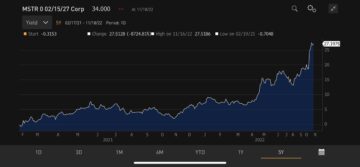Bitcoin is up, nearing $21,000 again, following some eventful few days that may turn heads in Wall Street and wider markets.
After a volatile yoyo on Wednesday’s interest rates decision, bitcoin fell to $20,200, but still fell less than Nasdaq.
A continued fall in Nasdaq on Thursday was met with indifference from bitcoin. The currency was unwilling to move down further, so declaring some mini-independence from Mr Powell.
Now it is moving up, with its price a bit higher than during Wednesday’s speech, and some say the reason is partially because unemployment has slightly risen to 3.7%.
Bad news is good in the tricks of fiat nonsense, but it remains quite unclear just how much bitcoin really cares about this considering it is not based on debt.
It does have some relationship to stocks however because there are now many crypto stocks trading, but for many of these stocks it is bitcoin that affects them, rather than the other way around.
Coinbase released its earnings for example and it’s a net loss of half a billion for Q3. Ouch. They’re down 83% over last year, and down 25% in the past 30 days. Bitcoin is up about 2% over last month.
So bitcoin is doing better than a lot of bitcoin proxy stocks, with the currency entering November, usually the last month to clear before one can start thinking about bull.
But Andrew Bailey of the Bank of England warned UK faces the longest recession since the Great Depression.
If that’s not a blockbuster ad for bitcoin then nothing is because this recession is being caused by these central banks which of course also caused the inflation.
There was no debate in 2020 regarding who exactly will pay for all that printing, so allowing no real discussion about all the tradeoffs.
There is no discussion about growth tradeoffs now either, in as far as central banks are coming across as completely deaf, with the deeply indebted governments so having ‘holes’ caused by the rise in interest rates.
These are the same bankers however that told us inflation will be transitory, although they never defined transitory, so why should anyone give their predictions and descriptions of some coming recession any credence?
The economy might instead ignore them completely, especially the global economy. That’s too complex of a market to really be directed by some committee, especially one that keeps getting it wrong.
This has happened every time this year, Powell said, after suggesting now they think rates will ultimately rise to a higher level than in September.
Well, how on earth are they getting it wrong every month? And if they are, as he admits, then what credibility does anything he say have?
The market instead has probably seen right through his attempt to get stocks down. It was perhaps to be expected he would be ultra-hawk seeing the excitement in stocks, but can he really do anything about it?
With the base rate now at 4%, he may well be nearing the ‘out of ammo’ stage because it is not too clear the market sees much difference between 4% and 6%, especially when compared to 0% with 4%.
Despite these rate hikes the economy has maintained some resilience. The worst of the hikes was arguably during summer, and Q3 saw decent growth for the United States.
At this stage, it is not clear even the wider market, let alone bitcoin, cares about the rates anymore. Property does, but that’s more a fiat bankers problem as for bitcoin some of that property cash might make its way to the asset.
We may have thus gotten through the re-adjustment. Rates are no longer news as such, energy has been sorted for Europe, and Russia at least so far has been contained.
The economy remains an unknown, but fundamentally there has been a lot of work on innovation for the past two decades, with that now starting to bear fruits as we see in industrial tech.
One thus should expect to see significant investment, both from the private and public sector, in upgrading our infrastructure especially where it concerns renewables – solar roofs – but also clean cars and soon enough clean planes.
That’s just the most visible part. All this may well restructure the economy, and the market may move from a default-save, when companies were sitting on trillions in savings, to default invest.
They have to if they are to stay in the market as a lot of these innovations are ‘carousel revolving.’ Think Nokia if you can’t keep up.
The central bank can only do so much in regards to those raw market forces. It can only affect the debtors, but plenty of companies have income and don’t have to necessarily rely on debt.
Those higher spending or investment levels may maintain growth, and as long as growth is higher than inflation, then inflation is irrelevant.
The only spanner in this may be banker capture as inflation dilutes debt which they don’t like. Like in UK where they’re raising taxes and cutting spending under the leash of corporate banks, but UK is too small to matter in the grand scheme as they most likely won’t be able to capture Europe.
The EU, in theory, has a $30 trillion pot because the EU itself currently has zero debt. Now that’s not money you can just spend, but when it comes to gaining an edge on energy especially – coupled with necessity – this rewiring of the pipelines could put down the foundations for a rising Europe.
While the peasants are told doom therefore, the investors are probably looking at where the boom might come from, and considering the astonishing resilience of bitcoin which didn’t care about Powell, some of those investors may well look at the crypto innovation which in part may be driving, at least narratively, innovation in the wider economy.
- Bitcoin
- blockchain
- blockchain compliance
- blockchain conference
- coinbase
- coingenius
- Consensus
- crypto conference
- crypto mining
- cryptocurrency
- decentralized
- DeFi
- Digital Assets
- ethereum
- featured
- machine learning
- Markets
- news
- non fungible token
- plato
- plato ai
- Plato Data Intelligence
- Platoblockchain
- PlatoData
- platogaming
- Polygon
- proof of stake
- Trustnodes
- W3
- zephyrnet











